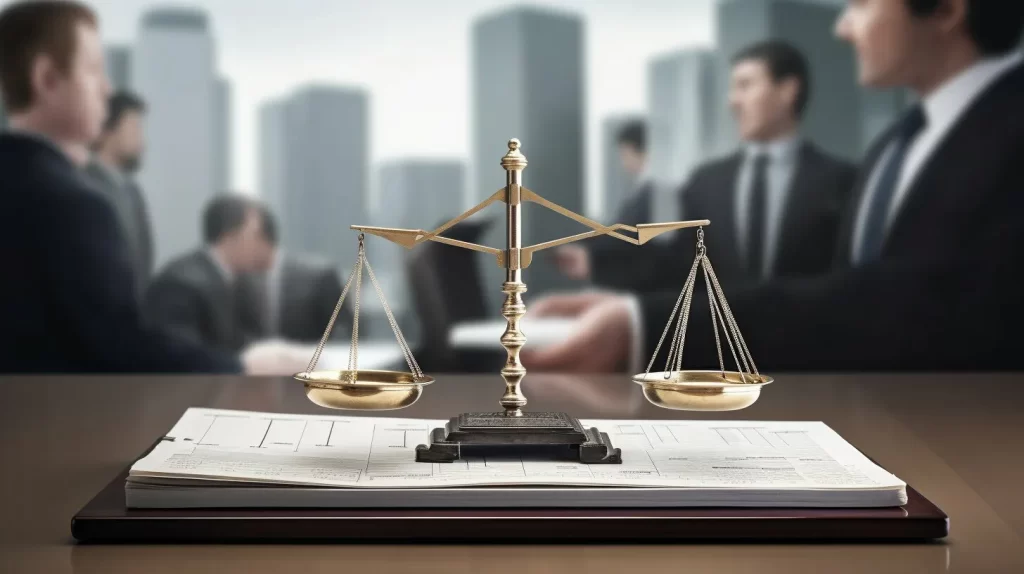Are you curious about the future of technology and the law? Are you fascinated with the idea of robots pleading in court? If so, this blog post is for you! We’ll explore the implications of robot lawyers and how they could potentially change the legal landscape as we know it.
Introduction to the Robot Lawyer
Next month, a defendant will receive advice from an artificial intelligence (AI) created by DoNotPay throughout the duration of a court case. The robot lawyer, which is powered by artificial intelligence (AI), will help the defendant to understand the court proceedings and respond to questions from the judge.
This trial run is the first of its kind and shows the potential of AI in the legal system. By using this technology, defendants will no longer need to hire a lawyer to represent them in court. Instead, they can use DoNotPay’s AI-powered technology to help them win their case.
This trial run is also significant because it shows that AI can be used to provide support to people who are vulnerable and do not have access to legal representation. Thanks to this technology, people who cannot afford a lawyer will now have access to justice.
The Man Behind the Robot Lawyer
For many people, the thought of speaking to a lawyer can be quite daunting. It can be expensive, and just talking to someone may not be enough to get your case resolved in your favor. This is where the robot lawyer comes in. DoNotPay, a company that offers legal advice through chatbots, has announced that it will be postponing a pending court case in order to focus on developing its technology.
The robots that will be used by DoNotPay are powered by artificial intelligence, and they are designed to provide legal advice to people with the help of chatbots. This is a great advancement for the field of law, as it allows people to get legal advice without having to spend a lot of money or time speaking to a lawyer. The robots are designed to provide accurate and unbiased information, and they are able to understand complex cases quickly.
This is an important step forward for the field of law, as it allows more people to get access to legal advice. By postponing a pending court case, DoNotPay is demonstrating its commitment to providing quality legal services at an affordable price.
The AI-enabled Legal Assistant
Next month, the world’s first robot lawyer will make its debut in court. Created by startup ‘DoNotPay’, the AI-enabled legal assistant will run on a smartphone and listen to all the court arguments in real-time. This artificial intelligence (AI) enabled legal assistant appears for the first time ever and will be powered by artificial intelligence.
This groundbreaking innovation will help defendants contest traffic tickets in court and will make the process more efficient for all involved. By using this innovative technology, defendants will not have to attend lengthy legal hearings and spend hours waiting in line.
This is a major step forward for the justice system and will help to reduce the number of people who are fined for traffic violations.
We can’t wait to see how this innovative technology develops over time, and how it will impact the way we prosecute criminals in court.
DoNotPay’s Plan to Fight Traffic Tickets
DoNotPay, a startup that plans to use artificial intelligence to help defendants fight traffic tickets, has announced that it will be using its GPT-powered chatbot in an upcoming traffic court case. Joshua Browder, the founder of DoNotPay, plans to take his app’s AI “robot lawyer” to court next month to contest a traffic ticket that he was issued.
While this is just a test case, Browder hopes that it will show the potential of GPT-powered chatbots in the courtroom and show judges that such technology is legitimate and not just a gimmick. If successful, Browder plans to use this technology to help more people fight their traffic tickets in the future.
While some attorneys are worried about the implications of using artificial intelligence in the courtroom, others are excited about the possibility that
GPT-powered chatbots may bring. As technology continues to improve, it is likely that we will see more and more applications of AI in the courtroom.
The Robot Pleading a Case in Court
Earlier this year, Joshua Browder’s artificial intelligence startup, DoNotPay, announced that it would be using artificial intelligence (AI) to plead cases in court. Now, the company has made history by having the first robot plead a case in court.
The hearing is slated to take place in June and will involve a defendant who was charged with a traffic violation. At the time of the plea deal, the defendant accepted a one-year jail sentence and a supervision order. However, an early AI tool assessed the defendant and determined that he would benefit more from an appeal.
As a result, DoNotPay has postponed the case to focus on developing its AI-powered robot lawyer. The robot will be used to represent clients in future court cases and provide legal advice in cases of delay in payment of fees. This is an exciting development for legal systems across the world and shows just how artificial intelligence can be used to improve efficiency and justice.
How the Robot Works to Defend a Speeding Ticket
The robot pleading in court is a reality, thanks to a startup called DoNotPay. DoNotPay has created the world’s first robot lawyer, which is going to take on two speeding ticket cases in court next. The robot lawyer is going to act as a legal assistant and help a defendant fight their speeding ticket in court.
The robot lawyer is going to be used on two speeding ticket cases next. The first case is set to happen next month and the second case will happen in 2020.
DoNotPay plans to have its “robot lawyer” help two defendants with speeding tickets in court through AI. The goal of this project is to help reduce the number of traffic tickets that are issued and to give defendants a better chance of getting their tickets dismissed.
So far, the project has received a lot of backlash from professional lawyers. They argue that the robot will not be able to provide an adequate representation for defendants. However, DoNotPay argues that the robot lawyer will be able to provide a more affordable option for defendants who cannot afford to pay for traffic tickets.
The project is still in its early stages, so we will have to wait and see how it pans out. For now, it is interesting to see how technology is being used to help people with legal problems.
Reactions of Professional Lawyers
Professional lawyers reacted with mixed emotions to the news that DoNotPay, a startup made up of artificial intelligence, is using this technology to help defendants in court. While some were excited to see such a disruptive technology being used in the legal system, others were concerned about the possible impact it may have on the profession.
The robot pleads in court will help defendants who are self-representing in court for minor driving or criminal offenses. First Published on Jan 9, 2023, it is designed to give instructions to the defendant about what to say in court. While this technology is new and has yet to be tested in a courtroom setting, professionals are excited about the potential it has to change the way the law is practiced.
Opportunities for Lawyers to Utilize AI Technology
Advances in artificial intelligence (AI) are transforming the legal field, and lawyers are now able to utilize AI technology to its fullest potential. Recently, a robot lawyer will be giving legal advice to defendants in the United States for the first time. Joshua Browder, CEO of DoNotPay, announced that the company will postpone a pending court case to focus on developing this technology. This is an exciting development for the legal field, and it shows just how far AI has come in recent years.
As robots become more common in society, it is only natural that they will increasingly be used in the courtroom. This is a major step forward for justice, and it will undoubtedly improve the quality of legal representation. Lawyers using AI for assistance is “becoming the norm and no longer a thing that’s nice to have”, says Eleanor Weaver, chief executive of AI law
firm i-Law. With so many advancements being made in the legal field, there is no doubt that AI will play an important role in the future of law.
Future of AI-Powered Robots in the Legal System
Next month, the world’s first ‘robot lawyer’ will make its debut in a US courtroom. Powered by artificial intelligence, the chatbot will advise a defendant in a pending court case. This is a historic first and shows the incredible potential of AI-powered robots in the legal system.
As artificial intelligence becomes more advanced, it is becoming easier and easier to incorporate it into law-related tasks. For example, robot lawyers can be used to help with legal research, drafting documents, and providing advice to defendants. This is a huge step forward for the justice system and shows just how much potential it is for robots to play a role in legal proceedings.
While this is the world’s first ‘robot lawyer’, it is not the last. There are already plans underway to create even more advanced chatbots that can assist with legal proceedings in a variety of ways. This is an exciting time for the legal industry, and we can only wait to see what else artificial intelligence can do to help make justice easier to access for all.
Conclusion
Today, in a traffic violation case in the United States, a robot plead guilty and was sentenced by a human court. The robot, powered by artificial intelligence, acted as the accused in the case. This is the first time a robot has pleaded a case in front of a human court, and it is an exciting development in the field of legal decision-making.
This trial demonstrated the potential for using robots to help with legal decision-making. By using artificial intelligence, the robot was able to make decisions for itself and present its case convincingly. This is an important step forward for re-engineering justice, as it allows for more efficient and less expensive decision-making processes.



